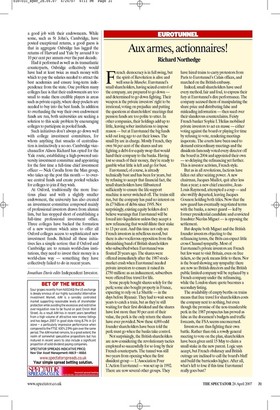Aux armes, actionnaires!
Richard Northedge
French democracy is in full swing, but the spirit of Revolution is alive and well sous la Manche. Eurotunnel’s small shareholders, having seized control of the company, are prepared to go down and determined to go down fighting. Their weapon is the private investors’ right to be irrational, voting on prejudice and putting the questions at shareholders’ meetings that pension funds are too polite to utter. In other companies, their holdings add up to little, leaving sober institutions to impose reason — but at Eurotunnel the big funds sold out long ago to cut their losses. The small fry are in charge. Mostly French, they own 94 per cent of the shares and are fighting a debt-for-equity swap that would hand their company to the banks. Having lost so much of their money, they’re ready to gamble what little is left and go for bust.
Eurotunnel, of course, is already technically bust and has been for years, but by refusing to accept that financial fact, the small shareholders have filibustered sufficiently to ensure the life-support machine is never switched off. The trains still run, but the company has paid no interest on its £7 billion of debts since 1995. Not surprisingly, existing equity holders don’t believe warnings that Eurotunnel will be forced into liquidation unless they accept a new refinancing that would dilute their stake to 13 per cent. And this time not only are French investors in rebellious mood, but there is also vociferous opposition from the diminishing band of British shareholders who subscribed when Eurotunnel was floated 20 years ago. The shares were offered immediately after the 1987 stockmarket crash when Eurotunnel needed private investors to ensure it raised its £750 million: as an inducement, subscribers were offered free travel for life.
Some people bought shares solely for the perk; some also bought property in France, expecting to rely on Le Shuttle — in the days before Ryanair. They had to wait seven years to catch a train, but as they’re still waiting for their first dividend and the shares have lost more than 90 per cent of their value, the perk is the only return the shares have ever provided. Now these 4,000-odd founder shareholders have been told the perk must go when the banks take control.
Not surprisingly, the British shareholders are now considering the revolutionary tactics employed so successfully for so long by their French counterparts. The tunnel was still two years from opening when the first dissident group — L’Association Pour L’Action Eurotunnel — was set up in 1992. There are now several other groups. They have hired trains to carry protestors from Paris to Eurotunnel’s Calais offices, and marched on the British embassy.
Indeed, small shareholders have used every method, fair and foul, to express their fury at Eurotunnel’s dire performance. The company accused them of manipulating the share price and distributing false and misleading information — then sued over their slanderous counterclaims. Feisty French banker Sophie L’Helias mobilised private investors to act en masse — either voting against the board or playing for time by refusing to vote, rendering meetings inquorate. The courts have been used to demand extraordinary meetings and the dissidents famously voted every director off the board in 2004 and appointed their own — so delaying the refinancing yet further. This is investor activism, French style.
But as in all revolutions, factions have fallen out after seizing power. A new chairman, Jacques Maillot, quit after less than a year; a new chief executive, JeanLouis Raymond, attempted a coup — and also swiftly departed, leaving Jacques Gounon holding both titles. Now that the new guard has eventually negotiated terms with the banks, a newer guard — led by former presidential candidate and convicted fraudster Nicolas Miguet — is opposing the settlement.
But despite both Miguet and the British founder investors objecting to the refinancing terms, the Brits can expect little cross-Channel sympathy. Most of Eurotunnel’s private investors are French but few want to visit Britain, even on free tickets, so the perk means little to them. Nor is the board showing any sympathy: there are now no British directors and the British public limited company will be replaced by a French company under the refinancing, while the London share quote becomes a secondary listing.
The availability of empty berths on trains means that free travel for shareholders costs the company next to nothing, but even though the promise of the non-transferable perk in the 1987 prospectus has proved as false as the document’s budgets and traffic forecasts, the FSA seems unconcerned.
Investors are thus fighting their own battle. Rather than risk a rowdy general meeting to vote on the plan, shareholders have been given until 15 May to claim a small stake in the new parent. Logic says accept, but French obduracy and British outrage are inclined to call the board’s bluff and build the barricades higher. After all, what’s left to lose if this time Eurotunnel really goes bust?
























































 Previous page
Previous page